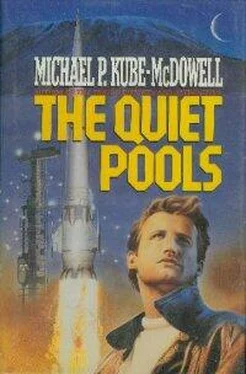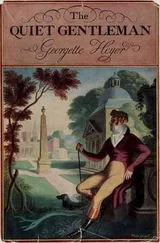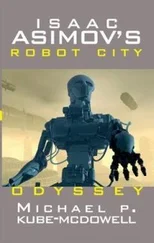“Yeah. Munich will put it up on a simulator, and Mission will go live with Prainha and the controllers at Horizon for a mock sailing and test program. Not our headache, thank God.”
“How goes the mole hunt?”
“A couple more pelts in the Logistics Section, and a fistful out in the supplier community—Micronomics turned out to have a whole nest. I keep thinking we should be finding more, though. Houston’s been clean for a year, Munich for two—makes me feel like I’m missing something.”
“Hmm. Speaking of missing something—has this one reached you? There’s a kind of oddball rumor circulating in Takara that Jeremiah is on Sanctuary.”
“I heard.”
“I haven’t been able to put anything hard underneath it,” Reid went on, “but it makes a certain amount of sense. Synthesized image, synthesized voice—no reason really to think that there’s a real Jeremiah anywhere, or that he’s necessarily a he. And the goals of Homeworld certainly are consistent with Sanctuary’s politics.”
“Yeah,” said Dryke. “The thing that keeps me from taking it seriously is I think Anna X would sooner cut out her heart than use a male persona as Sanctuary’s mouthpiece. But maybe that’s my blind spot, so stay with it.”
For the next ten minutes, they wandered off into other topics— a minor drug problem in the high-stress Tokyo office, a thrice-delayed test of Memphis’ shield lasers, a funny story about the starship’s lead architect getting lost during an inspection tour— and then Dryke ended the conversation.
“Well—departmental conference in ten minutes, and I need to make a side stop on the way. So I’m going to let you get back to whatever I took you from.”
“I could use a few more hours sleep,” Reid deadpanned.
“Get it while you can,” Dryke said with a sardonic half-grin. “The kids’ll be home from school soon.”
“That they will,” said Reid. “It’ll be nice to have the family back together again.”
Dryke chuckled, shook his head. “I’ll talk to you later,” he said, and broke the link. Turning away from the blank wall, he looked toward the silent spectator to the conversation, seated in the far corner of the room. “Opinion? Too obvious?”
“Perhaps not obvious enough,” said Hiroko Sasaki, rising and gliding toward him. “The Munich gateway has been open for three weeks without a single attempt at penetration.”
“Trolling for big fish takes patience,” said Dryke. “The bait has to be right, the fish has to be hungry, and you have to be lucky enough to run it past his mouth without him sensing the hook.”
“You spoke of Javier Sala,” she said. “We cannot allow Jeremiah such an opportunity. I am reluctant to permit any pioneers to board Memphis until Jeremiah has been found.”
Dryke shook his head vigorously. “Delaying habitation would be a mistake. The closer we are to succeeding, the bolder he’ll be in trying to stop us.”
“But will he be more reckless, or merely more ruthless?”
“Truthfully? I expect both.”
“ Memphis is not replaceable, Mikhail.”
“I know,” he said. “But there’s no safe way to gamble.”
CHAPTER 17
—CAU—
“… the voice of the banished …”
The Call icon popped up in one corner of Christopher McCutcheon’s work space, accompanied by a polite cheep .
“Who is it, Dee?” he asked his secretary.
“Lenore Edkins, Section 15,” answered the AIP. “You last talked to him on November 8.”
Edkins was a senior archaeolibrarian in the Culture Section. “I remember. I’ll take it,” McCutcheon said, suspending the error audit he had been conducting on the pre-Columbian thread of the North American Mythology stack. “Hello, Lenore.”
“Morning, Christopher,” said Edkins, a monk-haired black man with soulless eyes. “I’ve got some answers for you on that inquiry about your hyper entry. The Tunnel Visions telecast hadn’t been reviewed, now has been. It won’t be added to the hyper. Sorry.”
Crestfallen, McCutcheon asked, “Any idea why?”
“You play well enough, at least so I’m told by people more accustomed to hearing antique instruments. But the quality of the recording is only fair, and the auditor says that, taken as a whole, the music you three performed on the broadcast has ‘no significant entertainment or ethnomusicological value.’ Pretty standard phrasing. I’m afraid your Project connection wasn’t enough to swing the decision.”
“No value? We did the Bach cello suites in the Segovia arrangement—”
“Which are apparently in the hyper, as performed by Segovia, Parkening, and the e-pop version by Helix.”
“—’Mountain Storm,’ by Michael Hedges—”
“Also in the hyper by the composer’s own hand.”
“—and Kristen’s ‘Elegiac,’ which had everyone in the studio in tears.”
“A nice piece. But it was never professionally recorded, never published, and this Kristen Carlyle doesn’t come up in the stacks as either a performer or a songwriter. As near as I can tell, Tunnel Visions was as high as she ever got—thirty minutes on a regional arts showcase funded under USDC.”
Christopher gritted his teeth. In the smug economic classism of the Los Angeles ent-art world, Department of Culture grants were viewed as welfare handouts, and the work they supported little more than vanity indulgences. He hadn’t expected Edkins to show such colors. “What does any of that have to do with the music?”
Edkins sighed. “Look, you’ve done some work on the fiction stacks, haven’t you? What gets something in? Impact. Impact is the final criterion. You look at sales, cross-media citations, major reviews. You look for seminal ideas, innovative techniques, representative examples. What did the work give us? How did it change us?”
“So it has to be popular and prestigious,” said Christopher. “It’s not enough to be good.”
“It isn’t even necessary to be good,” said Edkins. “There are inferior fictions in the stacks because they added a single new word to the language, inferior songs because they caught everyone’s ear one summer. It’s not always fair. ‘Elegiac’ is a nice piece of work. I felt a tug, too. But it’s foam on the ocean, and no one’s going to miss it if it’s not there. Sorry, but that’s the truth.”
Discomfiting as it was, Christopher knew that Edkins was right, and that arguing was pointless. He had gotten Biography to add his degrees and his Hastings Award; he knew what a victory looked like, and this wasn’t one.
“All right, Lenore,” he said. “Thanks, anyway. I appreciate your taking a look at it.”
Edkins shrugged. “You’re family. No thanks needed. Sorry I couldn’t bring back better news. If you’re interested, though, I’ll tell you where the door is open.”
“Oh?”
“Tidwell’s holding a lot of space open for a Folklife stack on the Diaspora,” Edkins said. “The impact arrow points the other way on this one—we’re looking for what effect the starship Project’s had on people’s hearts and minds and muses. He’s particularly interested in off-net material, according to recent memos. So if you’ve got any material dealing with the Project, make sure I see it.”
Christopher brightened. “I might just have something. I’ll need to get a good recording made.”
“I can’t make an unconditional promise, mind you, but I’d say there’s a good chance that your musicianship and family connection would carry even a borderline piece in.”
“Charity, Lenore?”
Edkins shrugged. “I won’t spin you. It’s the back door. But it’s a door. Do you want to live forever, or not?”
Читать дальше

![Nick Cracknell - The Quiet Apocalypse [= Island Zero]](/books/28041/nick-cracknell-the-quiet-apocalypse-island-zero-thumb.webp)










